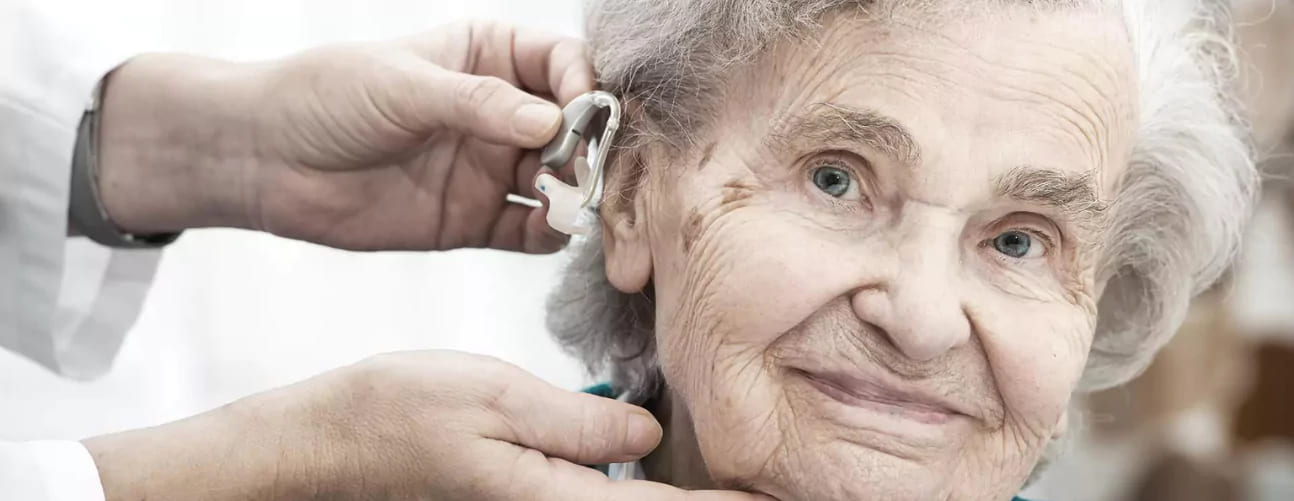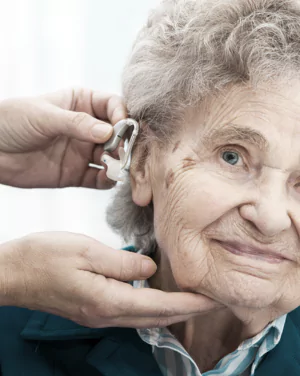

Treatments
The medical team at OTONEURO MONACO is actively involved in medical research and collaborates with the best practitioners to offer patients the most effective treatment possible, whether it be surgery, drug therapies, hearing aids or innovative therapies.
Deafness
Hearing aids
Hearing aids compensate for mild to moderate, and sometimes severe, hearing loss by amplifying and processing surrounding sound information via a microprocessor. The settings are adapted to the hearing loss of the ear being treated. It requires the intervention of a hearing care professional, who will choose the most suitable hearing aid based on the doctor’s diagnosis, the characteristics of the hearing loss and the patient’s goals. The hearing care professional will also monitor the hearing aid throughout its lifetime.
Cochlear implants
The cochlear implant is a highly sophisticated electronic device used to restore hearing in children and adults with severe or profound bilateral deafness by implanting an electrode in the inner ear and an external box that converts the surrounding sound information into electrical impulses. The OtoneuroMonaco team is authorised to perform pre-implant assessments and works in a network with cochlear implant centres in France and abroad.
Surgery
Some cases of deafness are linked to damage to the middle ear (eardrum, ossicles) that require surgery. This is the case with chronic otitis and otosclerosis.
More rarely, deafness is linked to a benign tumour of the vestibular nerve that compresses the auditory nerve in the inner ear canal or cerebellopontine angle (vestibular schwannoma).
Whether it is middle ear surgery, bone-anchored hearing implant placement or cerebellopontine angle surgery, the Otoneuro Monaco team has extensive experience in this area and will refer patients to partner auricular surgery centres if necessary.
Trans-timpanic Injections
Intra-tympanic corticosteroid injections are mainly used to treat sudden or fluctuating deafness due to labyrinthine hydrops. They also represent an important advance in the treatment of MENIERE disease, which is resistant to drug therapy.
They are performed under local and microscopic anaesthesia, with one injection per week for three weeks. After re-evaluation of the results, a second course of injections may be proposed. The results of this type of treatment are promising. The team at Otoneuro Monaco proposes and performs them whenever there is an indication.
Pharmacological Treatments
Pharmacological treatments are mainly prescribed for acute sensory hearing loss (sudden deafness) and are mainly based on oral or infusion corticosteroids. Vasodilators are also often prescribed. These can be combined with drugs to decrease inner ear pressure (acetazolamide, glycerol) when the cause of deafness has been identified as labyrinthine hydrops, and antiviral drugs if a viral origin is suspected.


Tinnitus
Hearing aids
Hearing aids are used to correct hearing loss, but they are also the standard treatment for tinnitus if it is associated with hearing loss. Treatment requires the intervention of a hearing aid specialist, who will choose the most suitable hearing aid based on the doctor’s diagnosis, the characteristics of the hearing loss and tinnitus, and the patient’s goals. The specialist will also monitor the hearing aid throughout its lifetime.
Cochlear implants
A cochlear implant is an extremely sophisticated electronic device used to restore hearing in children and adults with severe or profound bilateral deafness by implanting an electrode in the inner ear and an external box that converts the surrounding sound information into electrical impulses.
Recently, the indications for cochlear implants have been extended to unilateral profound deafness associated with disabling tinnitus. The Otoneuro Monaco team performs pre-implant assessments and networks with cochlear implant centres in France and abroad.
Bimodal Neuromodulation
Tinnitus results from abnormal activation of the auditory brain areas responsible for hearing. Bimodal neuromodulation is an innovative procedure to permanently reprogram the auditory brain areas. It is based on the simultaneous administration of auditory and lingual sensory stimuli, which are both projected onto the auditory areas of the brain and, thanks to the mechanism of neuronal plasticity, lead to a lasting attenuation or even disappearance of the tinnitus. Its efficiency has been proven by several large-scale clinical studies conducted by leading university teams. Otoneuro Monaco is the first otoneurology centre in France and Italy authorised by NEUROMOD (LENIRE process) to prescribe and monitor treatment with bimodal neuromodulation.
Psychological care
Tinnitus can cause or accompany significant psychological distress. After a clinical assessment during the interview, the patient may be offered psychological treatment based on cognitive and behavioural psychotherapy, hypnosis, sophrology or even psychiatric assistance. The results of these treatments are extremely convincing. Otoneuro Monaco works in a network with professionals specialised in the treatment of tinnitus.


Hyperacusis
Hearing protection
Hearing protectors are the standard treatment for hyperacusis. They are custom-made and adapted to the patient’s complaints by a hearing protector, who monitors the rehabilitation and adapts the hearing protector to the evolution of the patient’s symptoms.
Hearing aids
Hearing aids are used to correct hearing loss, but they are also the treatment of choice for tinnitus and hyperacusis when associated with hearing loss. They require the intervention of a hearing aid specialist, who will choose the most suitable hearing aid based on the doctor’s diagnosis, the characteristics of the hearing loss and hyperacusis, and the patient’s goals. He or she will also monitor the hearing aid throughout its lifetime.
Psychological assistance
Like tinnitus, hyperacusis can cause or accompany significant psychological distress. Following the clinical assessment during the consultation, the patient may be offered psychological treatment based on cognitive and behavioural psychotherapy, hypnosis, sophrology or even psychiatric treatment. The results of these treatments are extremely convincing. Otoneuro Monaco works in a network with professionals specialised in the treatment of tinnitus.


Vertigo and balance disorders
Pharmacological treatment
In cases of acute vestibular sensory deficit (vestibular neuritis, labyrinthine hydrops crisis, concussion, etc.), pharmacological treatment is mainly based on oral or infusion corticosteroids. Vasodilators and drugs to decrease inner ear pressure (acetazolamide, glycerol) are also often prescribed when labyrinthine hydrops has been identified as the cause of the vertiginous attack. Symptomatic drugs are also prescribed to reduce dizziness, nausea and vomiting (antiemetics).
The primary treatment of MENIERE disease is also based on drugs, mainly betahistine, acetylleucine and drugs to decrease inner ear pressure (acetazolamide, glycerol).
Finally, some central vestibular disorders may benefit from neurotropic drugs, the choice of which depends on the localisation of the lesion causing the disorders.
Intra-timpanic injections
Intra-timpanic corticosteroid injections represent an important advance in the management of MENIERE disease resistant to pharmacological treatment. They are performed under local anaesthesia and microscopically, with one injection per week for three weeks. After re-evaluation of the results, a second course of injections may be proposed. The results of this type of treatment are promising and very often lead to remission of the attacks. These treatments are proposed and carried out by the OTONEURO MONACO team whenever indicated.
Surgical intervention
Surgery may be indicated in certain forms of MENIERE for which all first-line treatments (medication) or second-line treatments (trans-tympanic injections) have failed. It consists of dissecting the vestibular nerve in the cerebellopontine angle or blocking the endolymphatic canal.
It can also be the remedy for a malformation of the inner ear (third labyrinthine window).
Vestibular rehabilitation
Vestibular rehabilitation is aimed at benign paroxysmal positional vertigo, for which it is the treatment of choice, but also more generally at balance disorders resulting from a poorly compensated vestibular deficit, disturbance of other sensory inputs or damage to the central nervous system. Vestibular rehabilitation involves the brain plasticity mechanism.
The precise diagnoses and functional assessments of balance system disorders carried out by the specialists at Otoneuro Monaco make it possible to offer each patient appropriate rehabilitation, either in-house or in cooperation with a network of highly qualified vestibular physiotherapists.
